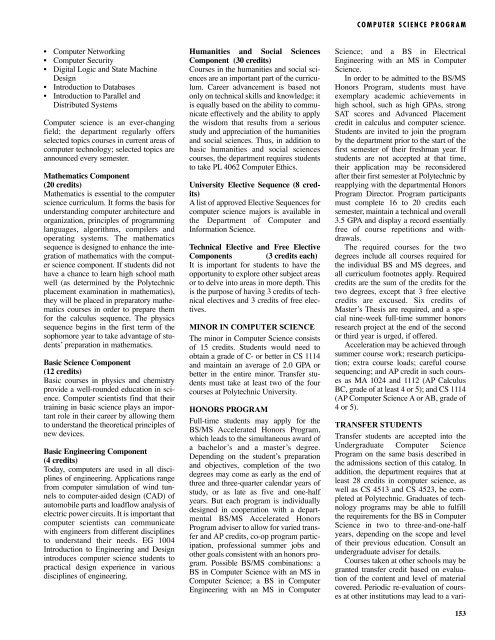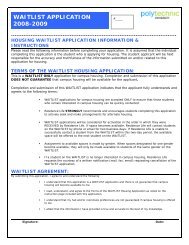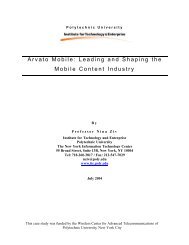POLYTECHNIC UNIVERSITY 2005-2007
POLYTECHNIC UNIVERSITY 2005-2007
POLYTECHNIC UNIVERSITY 2005-2007
Create successful ePaper yourself
Turn your PDF publications into a flip-book with our unique Google optimized e-Paper software.
COMPUTER SCIENCE PROGRAM<br />
• Computer Networking<br />
• Computer Security<br />
• Digital Logic and State Machine<br />
Design<br />
• Introduction to Databases<br />
• Introduction to Parallel and<br />
Distributed Systems<br />
Computer science is an ever-changing<br />
field; the department regularly offers<br />
selected topics courses in current areas of<br />
computer technology; selected topics are<br />
announced every semester.<br />
Mathematics Component<br />
(20 credits)<br />
Mathematics is essential to the computer<br />
science curriculum. It forms the basis for<br />
understanding computer architecture and<br />
organization, principles of programming<br />
languages, algorithms, compilers and<br />
operating systems. The mathematics<br />
sequence is designed to enhance the integration<br />
of mathematics with the computer<br />
science component. If students did not<br />
have a chance to learn high school math<br />
well (as determined by the Polytechnic<br />
placement examination in mathematics),<br />
they will be placed in preparatory mathematics<br />
courses in order to prepare them<br />
for the calculus sequence. The physics<br />
sequence begins in the first term of the<br />
sophomore year to take advantage of students’<br />
preparation in mathematics.<br />
Basic Science Component<br />
(12 credits)<br />
Basic courses in physics and chemistry<br />
provide a well-rounded education in science.<br />
Computer scientists find that their<br />
training in basic science plays an important<br />
role in their career by allowing them<br />
to understand the theoretical principles of<br />
new devices.<br />
Basic Engineering Component<br />
(4 credits)<br />
Today, computers are used in all disciplines<br />
of engineering. Applications range<br />
from computer simulation of wind tunnels<br />
to computer-aided design (CAD) of<br />
automobile parts and loadflow analysis of<br />
electric power circuits. It is important that<br />
computer scientists can communicate<br />
with engineers from different disciplines<br />
to understand their needs. EG 1004<br />
Introduction to Engineering and Design<br />
introduces computer science students to<br />
practical design experience in various<br />
disciplines of engineering.<br />
Humanities and Social Sciences<br />
Component (30 credits)<br />
Courses in the humanities and social sciences<br />
are an important part of the curriculum.<br />
Career advancement is based not<br />
only on technical skills and knowledge; it<br />
is equally based on the ability to communicate<br />
effectively and the ability to apply<br />
the wisdom that results from a serious<br />
study and appreciation of the humanities<br />
and social sciences. Thus, in addition to<br />
basic humanities and social sciences<br />
courses, the department requires students<br />
to take PL 4062 Computer Ethics.<br />
University Elective Sequence (8 credits)<br />
A list of approved Elective Sequences for<br />
computer science majors is available in<br />
the Department of Computer and<br />
Information Science.<br />
Technical Elective and Free Elective<br />
Components (3 credits each)<br />
It is important for students to have the<br />
opportunity to explore other subject areas<br />
or to delve into areas in more depth. This<br />
is the purpose of having 3 credits of technical<br />
electives and 3 credits of free electives.<br />
MINOR IN COMPUTER SCIENCE<br />
The minor in Computer Science consists<br />
of 15 credits. Students would need to<br />
obtain a grade of C- or better in CS 1114<br />
and maintain an average of 2.0 GPA or<br />
better in the entire minor. Transfer students<br />
must take at least two of the four<br />
courses at Polytechnic University.<br />
HONORS PROGRAM<br />
Full-time students may apply for the<br />
BS/MS Accelerated Honors Program,<br />
which leads to the simultaneous award of<br />
a bachelor’s and a master’s degree.<br />
Depending on the student’s preparation<br />
and objectives, completion of the two<br />
degrees may come as early as the end of<br />
three and three-quarter calendar years of<br />
study, or as late as five and one-half<br />
years. But each program is individually<br />
designed in cooperation with a departmental<br />
BS/MS Accelerated Honors<br />
Program adviser to allow for varied transfer<br />
and AP credits, co-op program participation,<br />
professional summer jobs and<br />
other goals consistent with an honors program.<br />
Possible BS/MS combinations: a<br />
BS in Computer Science with an MS in<br />
Computer Science; a BS in Computer<br />
Engineering with an MS in Computer<br />
Science; and a BS in Electrical<br />
Engineering with an MS in Computer<br />
Science.<br />
In order to be admitted to the BS/MS<br />
Honors Program, students must have<br />
exemplary academic achievements in<br />
high school, such as high GPAs, strong<br />
SAT scores and Advanced Placement<br />
credit in calculus and computer science.<br />
Students are invited to join the program<br />
by the department prior to the start of the<br />
first semester of their freshman year. If<br />
students are not accepted at that time,<br />
their application may be reconsidered<br />
after their first semester at Polytechnic by<br />
reapplying with the departmental Honors<br />
Program Director. Program participants<br />
must complete 16 to 20 credits each<br />
semester, maintain a technical and overall<br />
3.5 GPA and display a record essentially<br />
free of course repetitions and withdrawals.<br />
The required courses for the two<br />
degrees include all courses required for<br />
the individual BS and MS degrees, and<br />
all curriculum footnotes apply. Required<br />
credits are the sum of the credits for the<br />
two degrees, except that 3 free elective<br />
credits are excused. Six credits of<br />
Master’s Thesis are required, and a special<br />
nine-week full-time summer honors<br />
research project at the end of the second<br />
or third year is urged, if offered.<br />
Acceleration may be achieved through<br />
summer course work; research participation;<br />
extra course loads; careful course<br />
sequencing; and AP credit in such courses<br />
as MA 1024 and 1112 (AP Calculus<br />
BC, grade of at least 4 or 5); and CS 1114<br />
(AP Computer Science A or AB, grade of<br />
4 or 5).<br />
TRANSFER STUDENTS<br />
Transfer students are accepted into the<br />
Undergraduate Computer Science<br />
Program on the same basis described in<br />
the admissions section of this catalog. In<br />
addition, the department requires that at<br />
least 28 credits in computer science, as<br />
well as CS 4513 and CS 4523, be completed<br />
at Polytechnic. Graduates of technology<br />
programs may be able to fulfill<br />
the requirements for the BS in Computer<br />
Science in two to three-and-one-half<br />
years, depending on the scope and level<br />
of their previous education. Consult an<br />
undergraduate adviser for details.<br />
Courses taken at other schools may be<br />
granted transfer credit based on evaluation<br />
of the content and level of material<br />
covered. Periodic re-evaluation of courses<br />
at other institutions may lead to a vari-<br />
153




